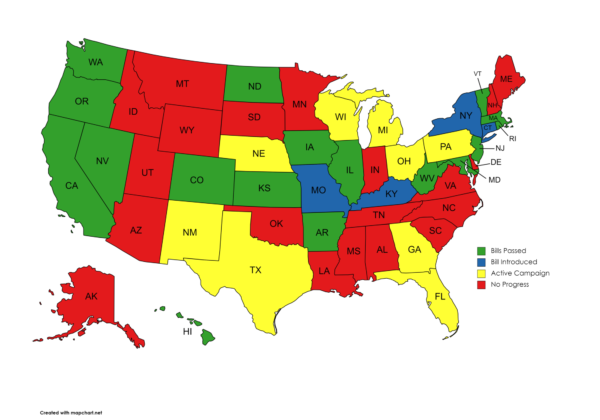American Obligations to the Ukrainian People
The United States has duties to a liberal world order; it must act on them in Ukraine.

It’s undeniable: the U.S. cannot ignore its responsibilities to the Ukrainians.
As the Russian invasion of Ukraine passes one year, the world is reassessing its commitments. The war began with a powerful Russian advance on the capital, Kyiv, that threatened to defeat Ukraine within the first months. After the Ukrainians fought back, the New York Times writes that Russia was pushed to its original strongholds in the Donbas region in the east and the Crimean Peninsula, with only minor gains to show for their intense struggle to push forward. The success of Ukrainian resistance is likely due to what the West has given it: The Atlantic reports that hundreds of tanks, artillery pieces, air-defense systems, and thousands of armored vehicles have been sent to Ukraine following the outbreak of war. The United States has been Ukraine’s largest supplier of arms, according to Euromaidan News, and while this military support is crucial, America has further duties to the preservation of Ukraine.
Since the invasion began, Ukraine has registered over 65,000 Russian-committed war crimes in the country up to the start of February 2023, states CNBC. The International Criminal Court is investigating attacks on infrastructure, writes Reuters, intended to destroy the country’s energy and water resources when they are most needed: winter. A prominent scholar on Eastern Europe and a key voice on the conflict, Anne Applebaum, calls Russia’s actions terrorism on her website. Applebaum’s analysis concludes that Russian military objectives use civilians to inflict the most harm on Ukrainian resistance and the nation’s nearby allies by creating refugees. The facts are conclusive, regardless of the exact numbers, that Russia is a state engaged in the most vile evils of war.
Knowing the human damage that has been affected in Ukraine, the United States ought to act on its moral dedications. A sizable majority of America’s population is against aid to Ukraine, and it has been declining substantially since the beginning of the war according to FiveThirtyEight. The emotional impact of the conflict hit Americans at the beginning of the war, but after a year, that effect is waning. President Biden’s 2022 State of the Union Address focused on the invasion, which was only days old. This year, the defense of Ukraine was mentioned fleetingly before moving on to Chinese aggression, a topic that garners far greater public hysteria and electoral success.
Convincing Americans that the Ukrainian war is unfortunate is simple; convincing them that America has obligations to Ukraine or to other peoples as a whole is not. This is a philosophical quandary that lies at an intersection of global affairs, political science, and ethics. My fundamental worldview is that the role of the state is to protect its citizens’ lives and liberties, but there are also obligations towards non-citizens. The state, when able, also has the duty to protect targets of violence worldwide as well as to advance democratic principles. The American republic is inherently internationalist; while it should avoid intervention in or from foreign powers, it does have both the prerogative and duty to prevent the grossest injustices from taking place.
If the United States holds this ideal as true, Ukraine is the most worthy contemporary example of its need. With American and broader Western support, the Ukrainian people can be provided greater safety from Russian violence. This rightfully includes military support for resistance efforts. But it also requires a larger commitment to stabilizing and democratizing Ukraine. Carnegie Europe wrote in 2016 of the Ukrainian government’s corruption problem, which has led to two popular movements to unsuccessfully combat it. Volodymyr Zelensky, the comedian turned leader of the country, was included in the Pandora papers for his offshore accounts and undisclosed business dealings according to The Guardian. Despite rising to power promising an end of governmental oligarchism, little changed under Zelensky’s leadership.
It’s important that the United States take a multifaceted approach to both end the violence and allow a sustainable democracy to blossom. France 24 wrote that Zelensky told Congress that continued arms donations are an “investment in… global security and democracy.” He’s right, but that investment needs to come with more substantial and long-term action.
The United States should begin by allowing an expedited and easier asylum process for Ukrainian refugees. A look at the U.S. Citizenship and Immigration Services page on Ukrainians fleeing to America should raise several problems in the observer’s mind. Firstly, Ukrainians must have a supporter already in the United States, which can be hard to organize by those without any means of communication with Americans or those who have already fled. Secondly, the process to do this is lengthy. Forms must be filled out and reviewed in a multi-step process that requires significant documentation. The refugee could well be dead before a bureaucrat deems them worthy of asylum. Thirdly, communicating this process is wildly difficult; Ukrainian refugees will likely have inconsistent access to internet services if they have it at all, so accessing this information is difficult. A prudent immigration policy in general, these ideas should be implemented now in relation to this conflict. The United States must offer Ukrainian refugees a chance to arrive in the United States and stay for as long as necessary. No sponsors, no I-134A forms, just safety.
Greater humanitarian aid for victims is also a necessity in Ukraine. The International Committee of the Red Cross writes that emergency relief, healthcare, and infrastructure are the greatest physical needs of the Ukrainian people. However, it is also necessary to remind the warring parties of the international humanitarian law implications of their actions and to visit prisoners of war. The United States has potential access to billions in frozen Russian assets. This money could support humanitarian efforts or the reconstruction of Ukraine once fully seized. Of course, such seizure would require due process of law; with a proper, just trial for all of the sanctioned Russian oligarchs whose assets are up for grabs, this money is ready for use.
Diplomatically, the United States needs to lead its allies in forming stronger relations with other states that could undermine Russian dominance. The Heritage Foundation names Azerbaijan and Kazakhstan as potential partners for the West to take away from Russia’s influence, as well as to augment Europe’s short fuel supplies. Containing the Russian bear requires defenses all around it. That means shoring up central Asia, Eastern Europe, and East Asia.
Following the end of the war, it is Ukraine’s democracy that must become America’s focus. Fighting corruption is, of course, a priority, but institutional change is required. A notoriously weak judiciary is especially vulnerable during reconstruction, the International Institute for Democracy and Electoral Assistance notes, because such a body needs to be able to arbitrate war crime hearings and dispense civil liberties for the Ukrainian people. Such inability has already proven detrimental to the defense of the nation, and it is clear that this fledgling democracy’s future depends upon the survival of a strong, independent judiciary. On debatably legitimate grounds, Zelensky has frequently suspended the civil rights of pro-Putin news outlets and political parties; while the sentiment is understandable, it does little but infringe upon citizens’ rights and lend legitimacy to Putin’s ideology as one of justice for his oppressed.
Securing wide-reaching democratization reforms will rely on incentivization using integration. The United States has limited opportunities for this; it is essentially able to offer a strategic trade and intelligence relationship to Ukraine. Pushing the European community to use its own institutions towards these ends can accomplish more. Putin’s invasion was likely prompted by Ukrainian efforts to join the European Union, which likewise prompted the annexation of Crimea in 2013 according to the BBC. The European Union has already granted the country candidate status for membership; by requiring political reform, a nation proven to be eager to join the European Union may make its largest leap towards integration.
With these policies, the United States has the capability to provide a meaningful and lasting contribution to Ukraine’s defense. It is the courage to take these steps, though, that is of the greatest importance to American citizens. Will the United States allow Ukraine to win the war and lose its future? Will it stand by as Ukrainian men, women, and children are cruelly and needlessly slaughtered by their Russian oppressors? It is surely the concern of a just and moral nation to protect its fellow humans, irrespective of their geographic location or allegiance.
This philosophy of balancing the lives and rights of citizens and preserving global humanity seems daunting, and it is. A staunch isolationist would believe that such international concerns are not the place of government; that the citizen, or perhaps more accurately the tax-payer, deserves the sole attention of its government. They may also allege that such a worldview is interventionism and promotes the eventual death of American soldiers defending non-American territory. It may be that domestic challenges are more pressing and deserve greater investment, including that spending on Ukraine could exacerbate inflation.
While these are real anxieties, their solutions lie in the nuance of action and the complex nature of geopolitics. The United States is not dedicating resources to the destruction of Russia. Moscow shall not burn when the Pentagon sends its next missile system. It is simply supplying, barely even, the protection of Ukrainian sovereignty. Whether this is the role of government is a question for one’s convictions on political philosophy. I am unfortunately unable to provide much greater justification than that human empathy dictates that we use our own structures to the protection of others. That simply has to be enough to excuse a temporary rise in the price of gas or eggs. A decent society will spend a couple dollars more on its items to save millions of lives.
An internationalist worldview does not discredit the United States as its own unit or its national interests. It does not inherently place its government in entangling alliances or make that government the world’s policeman. It does, however, require that the United States place a value on the human cost of a war that would otherwise not affect us. As a state that adores its democracy, the preservation of such cherished values is imperative. In the face of Putin and his regime of evil, America has no other course but the fiercest opposition.







